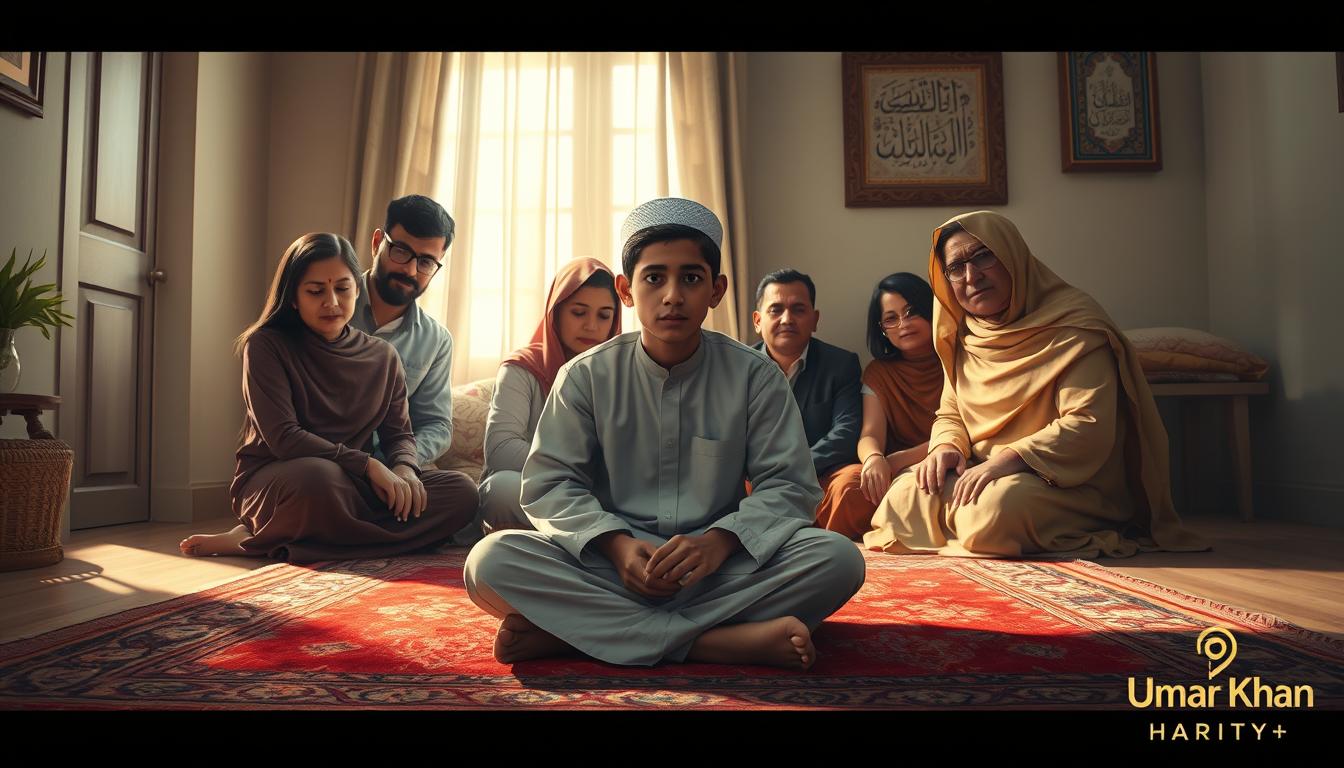At Umar Khan Charity Organization, we know how tough it can be to face family resistance after becoming Muslim. We offer support and a caring community. Our focus is on solving family conflicts and managing disagreements.
Many people share their stories and experts give advice on this issue. They say dealing with family resistance needs a careful and slow approach. This is where we help, guiding you through the process. We aim to help you manage family conflicts and find ways to resolve disagreements.
We want to give you the tools and knowledge to beat family resistance. Our goal is to help you find healing and understanding. These are essential steps in dealing with family resistance and solving conflicts.
Key Takeaways
- We support individuals in dealing with family resistance after converting to Islam.
- Family conflict resolution and managing family disagreements are key in this process.
- A careful and slow approach is needed when facing family resistance.
- It’s important to think about the emotional impact of conversion on everyone involved.
- Our organization offers resources and a caring community to help you through this.
- We aim to empower you with the tools and knowledge to overcome family resistance challenges.
- Healing and understanding are vital in dealing with family resistance and conflicts.
Understanding Family Resistance
Understanding why families resist change is key to solving conflicts. Acknowledging the emotional impact of conversion helps address concerns. This journey involves navigating family disputes and overcoming family objections. It makes family bonds stronger and more supportive.
Experts say family resistance often comes from not understanding Islam. Sharing resources and information helps family members grasp the decision to convert. This can be done by teaching them about Islamic values. This approach can turn opposition into support.
Some reasons for family resistance include:
- Fear of change and the unknown
- Misconceptions about Islam and its practices
- Concerns about the impact on family relationships
By understanding these concerns and addressing family opposition with kindness, we can strengthen family bonds. This journey needs patience, understanding, and a respectful approach to navigate family disputes.
| Strategy | Benefits |
|---|---|
| Open communication | Builds trust and understanding |
| Education and awareness | Helps to address misconceptions and concerns |
| Empathy and compassion | Fosters a positive and supportive environment |
Communicating Your Decision
Talking to your family about converting to Islam can be tough. Yet, it’s a key step in solving family conflicts. We stress the need for family conflict resolution and understanding in managing disagreements.
Think about when and where to have this talk. Pick a time and place that works for everyone. A well-thought-out message can make a big difference. It helps in overcoming objections and creating a supportive atmosphere.
Here are some tips for a good conversation:
- Choose a relaxed and comfortable setting for the talk.
- Be respectful and listen to your family’s worries.
- Highlight the good things about your conversion and how it’s changed your life.
Being sensitive and understanding can help solve family conflicts. It can also strengthen your bond with your family.
Strategies for Overcoming Resistance
Dealing with family opposition can be tough, but it’s doable with the right strategy. Staying calm and patient is key when facing resistance. This approach can greatly influence the outcome of family discussions.
It’s also vital to encourage open dialogue. This helps build trust and understanding among family members. By being calm and creating a safe space, you can reduce conflicts and foster better discussions. For more tips on engaging in family systems therapy and overcoming, consider professional advice.
Here are some effective strategies for overcoming resistance:
- Identify the main reasons for resistance
- Communicate clearly and with empathy
- Offer support and resources
- Encourage open dialogue and feedback
By using these strategies and staying dedicated to positive change, we can overcome resistance. This way, we can strengthen and deepen our family bonds.
Educating Family Members
We think it’s key to teach family about Islam to beat resistance. By providing resources like books, articles, and online courses, people can help their family get to know Islam better.
Here are some ways to teach family members:
- Sharing personal stories and experiences
- Providing access to Islamic literature and online resources
- Inviting them to experience Islamic practices such as attending a mosque or participating in a community event
By educating family members and providing resources, we can build bridges of understanding. This helps create a more supportive environment. We urge people to actively invite their family members to experience Islamic practices. This can lead to more understanding and acceptance.
Building Support Networks
We think it’s key to build support networks for those facing family resistance after becoming Muslim. Getting help from local Islamic communities and connecting with other converts can offer great advice. This helps them deal with family issues and find a place to belong.
Here are some ways to build these networks:
- Attending local Islamic events and gatherings
- Joining online forums and social media groups for converts
- Volunteering for Islamic charitable causes
Building support networks can give you emotional support, guidance, and a sense of community. It helps you stay strong and focused on your faith, even when family members resist. We urge people to look for these opportunities and connect with others who get what they’re going through.
Remember, building support networks takes effort and dedication. But with the right mindset and resources, you can beat family resistance and find peace and belonging in your faith.
| Benefits of Building Support Networks | Description |
|---|---|
| Emotional Support | Connecting with others who understand your experiences |
| Guidance | Seeking advice from local Islamic communities and other converts |
| Sense of Community | Finding a sense of belonging and connection with others |
Balancing Relationships
Changing to Islam can make family relationships tricky. It’s key to keep things healthy by balancing relationships and navigating family dynamics with care. Setting clear boundaries and talking openly helps avoid fights and strengthens bonds.
Here are some tips for balancing relationships:
- Respect everyone’s space and needs.
- Share your feelings and what you expect clearly.
- Always try to understand and be empathetic.
By following these tips, we can make our family environment better. Remember, balancing relationships is a continuous effort that needs patience and understanding.
Seeking Professional Support
Dealing with family resistance after converting to Islam can be tough. That’s why we suggest seeking professional support from religious counselors and community leaders. Family therapy options offer a safe space to work through conflicts and strengthen bonds.
Experts say getting professional help is key to beating family resistance. Working with religious counselors and community leaders can give you valuable advice. Family therapy can help in many ways, including:
- Improved communication: Family counseling can lead to a 70% improvement in communication among family members.
- Strengthened relationships: Therapy sessions can result in an 85% increase in strengthened relationships.
- Resolution of unresolved issues: Family counseling offers a 60% chance to address unresolved issues or ongoing conflicts.
Also, seeking professional support can help with big life changes, like divorce or moving. It can help manage stress and adjust to new roles with a 50% success rate. We encourage you to reach out to
By getting professional help and working together, we can beat family resistance and build stronger, loving relationships. Remember, asking for help is a sign of strength, not weakness.
| Benefits of Family Therapy | Success Rate |
|---|---|
| Improved Communication | 70% |
| Strengthened Relationships | 85% |
| Resolution of Unresolved Issues | 60% |
Sharing Your Faith Journey
We encourage people to share their faith journey with their family. By sharing your faith journey, you can build bridges of understanding. This helps create a more supportive environment. You can do this by showing the benefits of your faith and how it has changed your life for the better.
Sharing your faith journey in a positive way is key. Personal stories and advice from experts stress this point. Here are some tips to keep in mind:
- Be respectful and sensitive to others’ beliefs and feelings.
- Focus on the good things your faith has brought into your life.
- Use personal testimonies to show how your faith has made a difference.
- Highlight positive changes in your life and relationships.
By sharing your faith journey thoughtfully, you can make your environment more supportive.
| Benefits of Sharing Your Faith Journey | Positive Outcomes |
|---|---|
| Builds bridges of understanding | Fosters a more supportive environment |
| Helps to create a sense of community | Encourages personal growth and development |
Understanding Cultural Differences
We know how key it is to understand cultural differences in making our family bonds stronger. By addressing misconceptions about Islam and acknowledging cultural backgrounds, we can ease worries. This helps create a welcoming space for everyone.
Experts say that understanding cultural differences is vital for a caring and learning space. It means addressing misconceptions and acknowledging cultural backgrounds. This builds trust and encourages positive changes.
Some important things to think about when understanding cultural differences are:
- Seeing how cultural values and beliefs shape family life
- Valuing the variety of cultural backgrounds and traditions
- Fixing wrong ideas and stereotypes that might be around
By following these ideas, we can aim for a more united and supportive place for all.
| Aspect | Importance |
|---|---|
| Understanding cultural differences | High |
| Addressing misconceptions | High |
| Acknowledging cultural backgrounds | High |
Volunteering and Community Engagement
We think volunteering and community engagement are key to stronger, more supportive ties. By joining in charitable work, people can positively impact their communities. The Umar Khan Charity Organization supports those facing family resistance, providing chances to volunteer and engage with the community.
Volunteering lets people learn new skills, meet others, and help their communities grow. Community engagement builds trust and understanding among different groups. We urge people to volunteer and engage in their communities, as it deeply affects their lives and those around them.
Some benefits of volunteering and community engagement include:
- Developing new skills and gaining experience
- Meeting like-minded people and building relationships
- Contributing to the betterment of the community
- Fostering a sense of purpose and belonging
The Umar Khan Charity Organization offers chances for volunteering and community engagement. By participating in charitable activities, individuals can positively change their communities and find purpose. We invite you to join us in this meaningful work.
| Organization | Volunteering Opportunities | Community Engagement |
|---|---|---|
| Umar Khan Charity Organization | Charitable activities, events, and projects | Community outreach, education, and support |
Reaffirming Love and Respect
When facing family resistance after converting to Islam, it’s key to show your love and respect. Keeping family ties strong and being thankful for their support can make a big difference. It helps create a more loving and supportive space.
The Importance of Maintaining Family Bonds
Keeping family connections strong is vital during this time. By staying in touch and talking openly, you show your dedication to the family. This can ease worries and build trust slowly.
Expressing Gratitude for Family Support
It’s important to thank your family for any support they give, even if it’s small. Being truly thankful can help fix relationships and make things better. It might also make your family more open to your faith journey.






